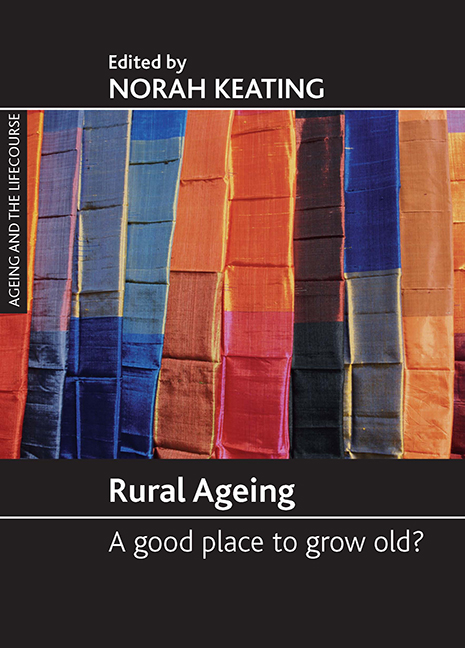Book contents
- Frontmatter
- Contents
- Foreword
- Acknowledgements
- Notes on contributors
- one A critical human ecology perspective on rural ageing
- two Crossing borders: lifecourse, rural ageing and disability
- three Rurality and ageing well: ‘a long time here’
- four The evolution of networks of rural older adults
- five Distance, privacy and independence: rural homecare
- six Respite for rural and remote caregivers
- seven Ageing, disability and participation
- eight Participation in rural contexts: community matters
- nine Staying connected: issues of mobility of older rural adults
- ten Ageing and social exclusion in rural communities
- eleven Age-friendly rural communities
- twelve Revisiting rural ageing
- References
- Index
- Other titles in the Ageing and the Lifecourse series
twelve - Revisiting rural ageing
Published online by Cambridge University Press: 19 January 2022
- Frontmatter
- Contents
- Foreword
- Acknowledgements
- Notes on contributors
- one A critical human ecology perspective on rural ageing
- two Crossing borders: lifecourse, rural ageing and disability
- three Rurality and ageing well: ‘a long time here’
- four The evolution of networks of rural older adults
- five Distance, privacy and independence: rural homecare
- six Respite for rural and remote caregivers
- seven Ageing, disability and participation
- eight Participation in rural contexts: community matters
- nine Staying connected: issues of mobility of older rural adults
- ten Ageing and social exclusion in rural communities
- eleven Age-friendly rural communities
- twelve Revisiting rural ageing
- References
- Index
- Other titles in the Ageing and the Lifecourse series
Summary
Introduction
Throughout this book, authors have undertaken analyses of processes of ageing in rural contexts. A goal has been to deconstruct unidimensional although opposing constructs of rural places as ‘hinterlands bereft of opportunity and socially and culturally lagging or of idyllic pastoral settings’ (Chapter One, p 1). Rural settings explored in this book are diverse. Older adults in South-East England and those in the vast prairies of western Canada live in places that differ considerably in size, distance from services and landscape. Such rural places represent both hinterlands and idyllic settings – and yet neither of these. Authors have addressed many such stereotypes of older adults and of rural places, expanding discourses about ageing in rural settings. Lifecourse and critical human ecology approaches have been used to situate older adults across time and in relation to place.
While processes of ageing are often acknowledged, understanding ageing requires a lifecourse perspective where change is assumed and interrogated. Authors have examined change across the adult lifecourse through longitudinal research on the evolution of convoys of support from family and friends; through comparisons of community participation of people across the adult lifespan; and through narratives of older adults looking forward towards the next phases of their lives and backward as they reflect on the ongoing creation of their identities as they traverse the lifecourse. These examinations of ageing put the focus on the unfolding of lives rather than on the more usual emphasis on late-life resources and frailties.
Critical reflections in this book are about the interaction between these processes of ageing of rural adults and the contexts of their lives: space, place, people and time. Authors have explored diversity by considering a variety of older adults. In their work, we see stark contrasts between active, engaged older adults who comprise the core of the voluntary sector in their communities, and those who are excluded by lack of material resources and poor social relationships.
In this final chapter, main sets of findings are explored: about rural places and beliefs; about processes of ageing; and about the ‘best fit’ between these places and processes and the contexts in which rural people grow older.
Understanding rural places and beliefs
In the exploration of ageing in rural settings, a key issue has been to consider conceptualisations of rural that are most relevant in understanding whether rural settings are good places to grow old.
- Type
- Chapter
- Information
- Rural AgeingA Good Place to Grow Old?, pp. 121 - 130Publisher: Bristol University PressPrint publication year: 2008
- 2
- Cited by



